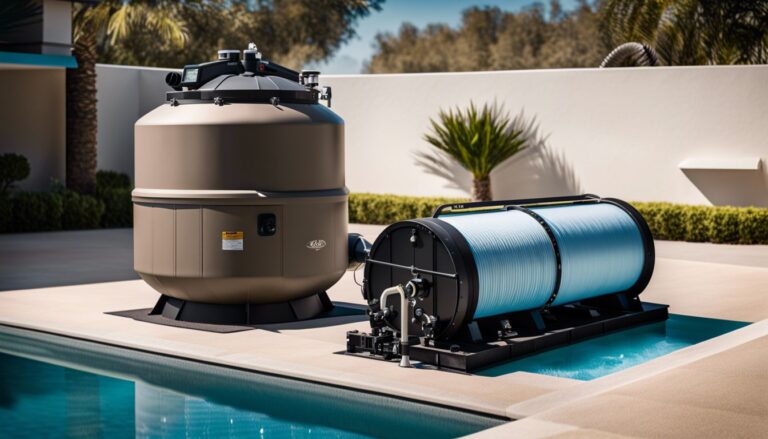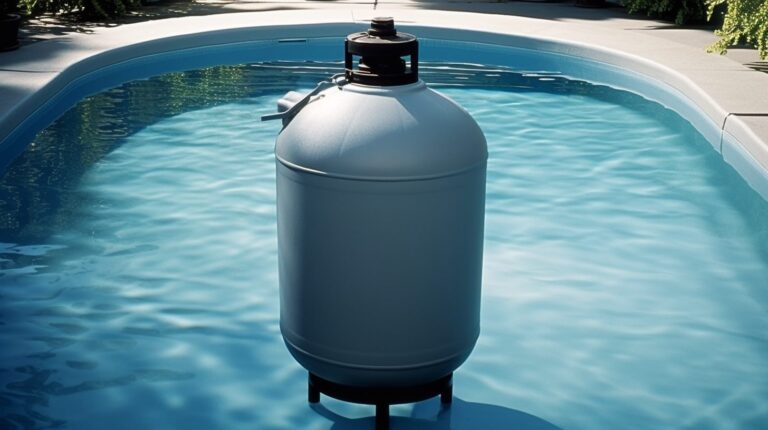How Long Does it Take to Heat a Pool? Heater Calculator 2023
How Long Does it Take to Heat a Pool?
How long does it take to heat a pool? This post will explain the factors that influence heating time, how long it takes to heat an average-sized pool by 10 degrees, and guide you on achieving that perfect swimming temperature more efficiently.
Key Takeaways
- Factors such as the initial state of the water, type of heating system used, local climate, pool surroundings, pool covers, and size and depth of the pool can affect heating time.
- Heat pumps typically take between 24 and 72 hours to raise the water temperature by about 20 degrees Fahrenheit (11 degrees Celsius).
- Solar heating can increase the temperature of your pool by approximately 2.5ᵒ to 5.5ᵒ C per day, making your pool up to 8-12 degrees warmer than unheated pools on average.
Factors Affecting Pool Heating Time
Several factors can impact the time it takes to heat a pool, including the initial state of the water, the type of heating system used, the local climate, pool surroundings, pool covers, and the size and depth of the pool.
How Long Does it Take to Heat a Pool? Initial state of the water
The initial state of your pool water plays a significant role in determining how long it will take to heat. If you’re starting with cooler water, say after winter or during the colder months, you’ll need more energy and time to reach the desired temperature.
For instance, heating an average-sized pool by 10 degrees usually takes approximately six hours using a standard 300 BTU heater. On a similar note, refilling your pool may require additional heating time due to the cold tap water used for refill.
Hence, many pool owners prefer maintaining their pools at a comfortable temperature even when not in regular use. This strategy helps minimize heating times for those spontaneous dip moments and unplanned pool parties.
Heating systems (heat pump, solar, gas)
The heating system is an essential aspect when planning to heat a pool. This can be based on heat pumps, solar, or gas.
| Heating System | Description | Pros | Cons |
|---|---|---|---|
| Heat Pump | A heat pump uses electricity to transfer heat from the environment to your pool. It flows through a heat exchanger, where heat from the air is transferred to the water. It can take approximately 24 to 72 hours to heat a pool by 20°F. | Heat pumps are cost-effective and eco-friendly. Some users leave them on continuously for consistent heating. | Regardless of the outside temperature, gas heaters can quickly heat the pool water. |
| Solar | Solar heaters use solar energy to warm the pool water. The number of panels required depends on the pool’s size and location. | Solar heaters use a renewable energy source and can significantly reduce heating costs over time. | They depend on sunshine for operational efficiency. In regions with less sunlight, they may not be as effective. |
| Gas | Gas heaters use propane or natural gas to heat the pool water. | Gas heaters can quickly heat the pool water, regardless of the outside temperature. | They are not as energy-efficient as heat pumps or solar heaters and can lead to higher utility bills. They also require a steady supply of propane or natural gas. |
Choosing the best heating system depends on your budget, local climate, and the desired pool temperature.
Local climate
Your local climate plays a significant role in determining how long it takes to heat your pool. The task isn’t too daunting in warmer regions as the sun contributes significantly to heating the water.
However, you’re looking at increased heat loss for cooler climates with lower temperatures and high wind speeds. This means your pool heater needs to work harder and longer, increasing energy use and, consequently, your energy bill.
This is where having an efficient heating system comes into play; solar systems or gas heaters might be best if you live in such areas. It’s essential to consider average air temperature and weather conditions when planning for pool heating time!
Pool surroundings
The surroundings of your pool can have a significant impact on its heating time. If your pool is surrounded by trees or buildings that block out the sun, it may take longer to heat up.
On the other hand, if your pool is in an open area with direct sunlight, it will warm up more quickly. Wind exposure can also affect how long your pool will take to heat up.
Windy conditions can cause heat loss and make it harder for your heating system to maintain the desired temperature. So when choosing the location for your pool, consider factors like sunlight exposure and protection from wind to optimize its heating efficiency.
Pool covers
A pool cover is one of the best ways to speed up pool heating and retain heat. An uncovered pool can lose heat at around 0.06°C or more per hour through evaporation alone, which can significantly lengthen the heating time.
Using a solar cover, you can extend the pool heating season by three months or more, as it helps trap heat from the sun during the day and prevents heat loss overnight. On average, a solar pool cover can increase the water temperature by up to 5 degrees within 12 hours.
This simple addition saves on energy costs and ensures that your swimming season lasts longer, allowing for more enjoyable days spent in warm water.
Pool size and depth
The size and depth of your pool are important factors to consider regarding heating time. A larger pool will naturally take longer to heat than a smaller one. The surface area and volume of the pool play a role in determining the heating requirements.
Additionally, the depth of the pool also affects how long it takes for the water to reach your desired temperature. So, if you have a large or deep pool, it takes longer to heat up than a smaller or shallower pool.
Pool Heat Calculator
This calculator from Pool Warehouse will give you a rough idea of how long it takes.
The Impact of Water Temperature

Water temperature plays a crucial role in the comfort and enjoyment of your swimming pool. Not only does it affect the overall experience, but it also has significant implications for energy consumption and heating costs.
The ideal water temperature for most pool owners falls between 78ºF to 82ºF, providing a comfortable environment for swimming and relaxation. However, weather conditions, heater efficiency, and insulation can impact how quickly your pool reaches this desired temperature.
For example, colder air temperatures and high wind speeds can increase heat loss in your pool, requiring more energy from your heating system to maintain the desired warmth.
On the other hand, if you live in a warmer climate or have ample direct sunlight on your pool surface throughout the day, you may be able to rely on natural solar heating to warm up the water faster.
Pool owners need to consider these variables when determining how long their specific pools will take to reach their desired temperature. By understanding these factors and making informed decisions about appropriate heating systems and techniques (such as using pool covers or optimizing circulation), you can maximize energy efficiency while ensuring that your pool is consistently at its optimal temperature for year-round enjoyment.
Recommended Heating Times
Heat pump: A heat pump can take between 12-24 hours to raise the pool water temperature by around 1-2 degrees. Want to know the recommended heating times for other types of pool heaters? Keep reading!
Heat pump
Using a heat pump to heat your pool is an efficient and cost-effective way to maintain a comfortable swimming temperature. Heat pumps typically take between 24 and 72 hours to raise the water temperature by about 20 degrees Fahrenheit (11 degrees Celsius).
The actual time depends on factors like the pump’s BTU output, the water’s initial state, and the pool’s size. It’s important to note that while heat pumps may take longer than other heating methods, they tend to last longer and result in long-term cost savings.
So if you’re looking for an effective way to warm up your pool, a heat pump could be a great option.
Solar heating
Solar heating is a sustainable and cost-effective way to heat your pool. With solar panels installed, you can increase the temperature of your pool by approximately 2.5ᵒ to 5.5ᵒ C per day, making your pool up to 8-12 degrees warmer than unheated pools on average.
The best part is that solar pool heating systems can work for around 20 years with minimal maintenance. By harnessing the sun’s power, you can extend your swimming season by up to four months a year and enjoy warm water even during colder months.
So if you’re looking for an eco-friendly and efficient way to heat your pool, consider investing in solar heating.
Gas heating
Gas heating is a popular option for quickly and efficiently heating your pool. Gas pool heaters can provide fast heat, allowing you to enjoy your pool in minutes or hours. These heaters use natural gas or propane to generate warmth, providing a faster heating process than other methods.
The size of the heater is based on its BTU per hour, which determines how much heat it can produce. Remember that gas heaters consume fuel, with propane heaters typically burning around 1 gallon per hour for every 100,000 BTU.
So if you have a 400,000 BTU heater, it will take about 4 gallons of propane per hour. The cost of natural gas varies depending on location and market fluctuations. Gas heating offers an efficient and convenient way to heat up your pool quickly so you can enjoy the water more.
Tips to Speed Up Pool Heating
To speed up pool heating, use a pool cover to prevent heat loss when the pool is not in use.
Use a pool cover.
Using a pool cover is one of the most effective ways to heat your pool faster and save on energy costs. Pool covers not only prevent evaporation, but they also act as a barrier between the water and installing loss.
Installing a swimming pool cover can increase the temperature of your pool by up to 5 degrees in just 12 hours on average. Keeping your pool covered as much as possible’ll maximize heating and minimize the time and energy required to warm up the water.
Plus, with reduced evaporation, you won’t have to constantly refill your pool, saving you even more money in the long run. Overall, using a pool cover is an easy yet effective way to speed up pool heating and enjoy comfortable swim temperatures sooner!
Optimize heating system settings.
To optimize the heating system settings for your pool, there are a few key things to keep in mind. First, consider adjusting the temperature settings based on your usage patterns. Lowering the temperature slightly during periods when the pool is not in use can help save energy and reduce heating costs.
Additionally, ensure your pool’s circulation system runs efficiently by regularly cleaning and maintaining it. This will unevenly distribute distributed evenly throughout the and minimize any heat loss.
Lastly, if you have a programmable thermostat or timer for your heating system, use these features only to heat your pool when needed, such as before planned swimming sessions or gatherings.
Consider solar blankets or heating mats.
Solar blankets or heating mats are a great addition to your pool heating system. They can help trap the sun’s heat and keep your pool water warm for longer. Solar covers can increase the temperature of your pool by up to 5 degrees in just 12 hours on average! Not only that, but they also play a crucial role in reducing heat loss and energy consumption.
So if you’re looking for an efficient way to speed up the heating process and maintain warmth in your pool, investing in solar blankets or heating mats is worth considering.
Maintain proper water circulation.
Proper water circulation is crucial for efficient pool heating. When your pool’s water circulates effectively, it ensures that the warm water produced by the heating system is evenly distributed throughout the entire pool.
This helps to eliminate any cold spots and promotes faster heating. In addition, proper circulation prevents heat loss by continuously pushing warmer water toward cooler areas of the pool.
To maintain proper water circulation, ensure your pool’s pump and filter are in good working condition and regularly clean or backwash them as needed. This will help keep your pool comfortable and ready for swimming whenever you need it!
The Perfect Pool Temperature
– The ideal pool temperature for most people is between 86°F and 90°F (30°C and 32°C).
– People with arthritis may prefer even higher pool temperatures.
– It is important to consider the comfort level of all potential swimmers when setting the pool temperature.
– A warm water temperature can enhance relaxation and therapeutic benefits.
– Warmer water temperatures are especially beneficial for muscle recovery after exercise or physical activity.
– Remember that higher water temperatures may also increase evaporation, which can affect the overall chlorine balance in your pool.
Conclusion
In conclusion, the time it takes to heat a pool depends on several factors, including the initial state of the water, heating systems used, local climate, pool surroundings, and pool covers.
Gas heaters are generally the fastest option for heating a pool, while heat pumps and solar systems may take longer. However, with proper planning and maintenance strategies, such as using a pool cover and optimizing heating system settings, pool owners can effectively speed up the heating process.
Understanding these factors will help potential pool owners make informed decisions about how long it will take to heat their pools for maximum enjoyment during swim season.
FAQs
1. How long does it typically take to heat a pool?
The duration to heat a pool varies depending on various elements like the size of the pool, the difference in temperature between the desired warmth and the current water temperature, and the type of heating system in use. On average, it might take f few hours to a few days.
2. How does a gas pool heater work?
Gas pool heaters function by utilizing either natural gas or propane as fuel. The pump circulates water from the pool, passing through a filter and going into the heater. The gas in the combustion chamber burns, and the heat exchanger transfers the heat to the water. It’s a great way to heat your pool rapidly, irrespective of the ambient temperature.
3. What are the advantages of solar pool heaters?
Solar pool heaters are an eco-friendly option and are perfect for sunny days. They harness the sun’s rays and convert them into heat energy, raising the pool’s temperature. While they may have a higher initial cost, solar heaters offer much energy savings in the long run, extending the pool season into the cooler months.
4. Are solar blankets effective in heating pools?
Solar blankets or solar pool covers are an excellent choice for heating your pool. They function by minimizing evaporation and trapping the sun’s rays, warming the water. Solar blankets can be especially effective for smaller pools and are an economical option.
5. Can electric pool heaters and heat pumps speed up pool heating?
Electric pool heaters and heat pumps can considerably reduce the time it takes to heat a pool. Heat pumps are energy-efficient and work by transferring warm air from the environment into your pool. Electric heaters, while faster, consume more energy. Choosing the best option depends on factors like pool size, ambient air, and the time of year.
6. How can I maintain a constant temperature in my pool?
To maintain your pool’s temperature, consider using solar pool covers or liquid solar covers, which help to prevent heat loss and reduce evaporation. Regular checks for leaks in your heating system and adjusting the settings for optimal efficiency are also essential.
7. What role does the size pool heater play in heating a pool?
The size of the pool heater can significantly impact the time taken to heat the pool. A heater’s capacity is measured in British Thermal Units (BTUs), and the right BTU rating depends on factors like the volume of water in the pool and the temperature rise needed. For instance, larger pools might require a heater with higher BTUs.
8. What is the fastest way to heat a pool?
The fastest way to heat a pool typically involves using a gas or electric heater due to its higher BTU output. However, the specific ‘best way’ depends on factors like your pool size, available budget, desired temperature, and environmental factors.
9. Does the time of year affect pool heating?
Yes, the time of year can affect pool heating. During colder months, pools lose heat more quickly to the environment, meaning more energy may be required to maintain a comfortable swimming temperature. Conversely, in warmer months, especially sunny days, the pool may naturally stay warmer and require less additional heating.
10. How does the ambient temperature influence pool heating?
Ambient temperature plays a significant role in pool heating. Higher ambient temperatures can help your pool heat up faster and retain the heat longer, while lower temperatures can result in slower heating and faster heat loss.
11. Can solar rings or solar domes help in heating the pool?
Solar rings or domes are useful additions to heat your pool. They float on the pool’s surface, attracting and capturing the sun’s heat, then transferring it to the water. They are easy to install and a good choice for smaller pools or during sunny weather.






